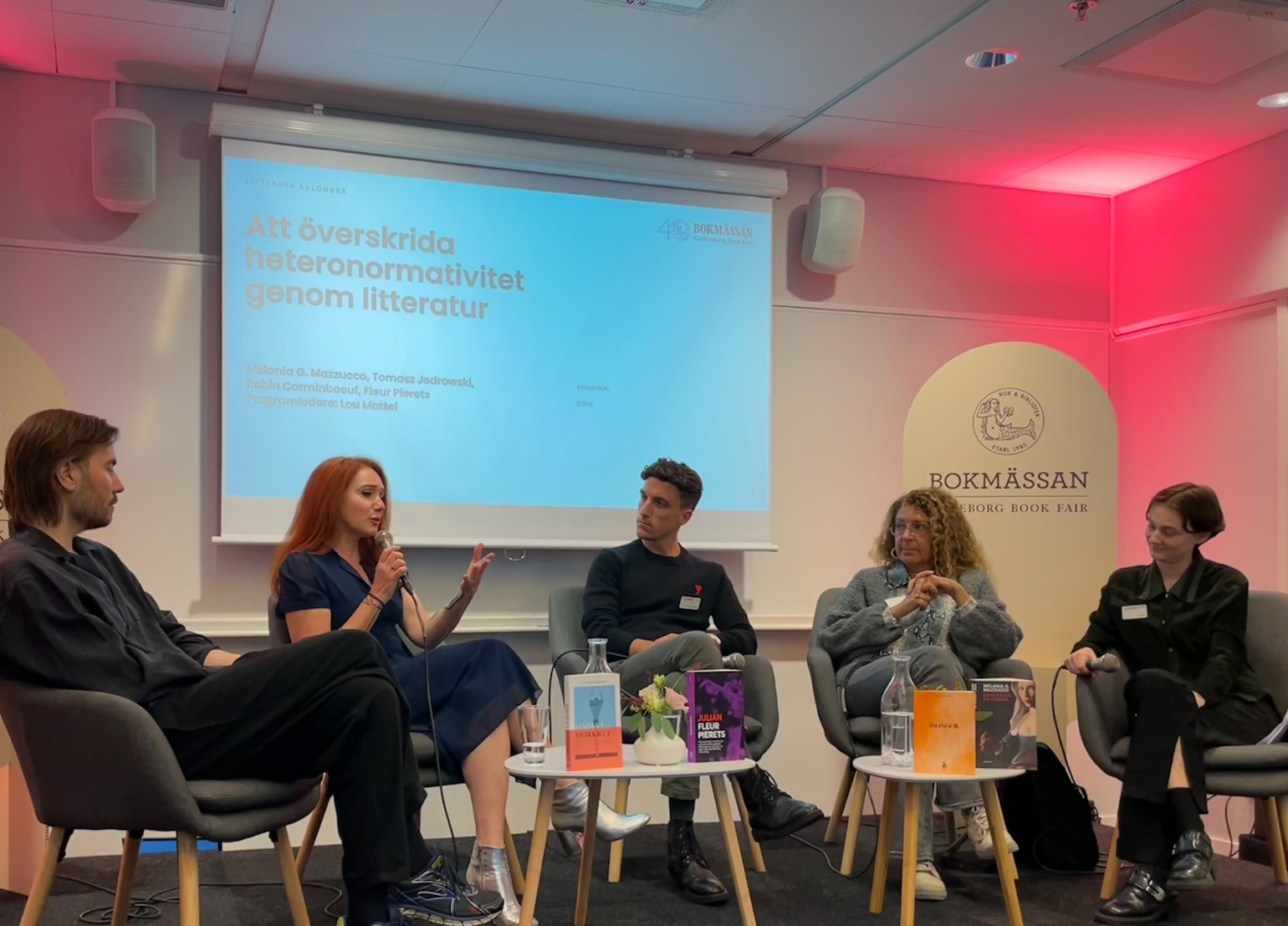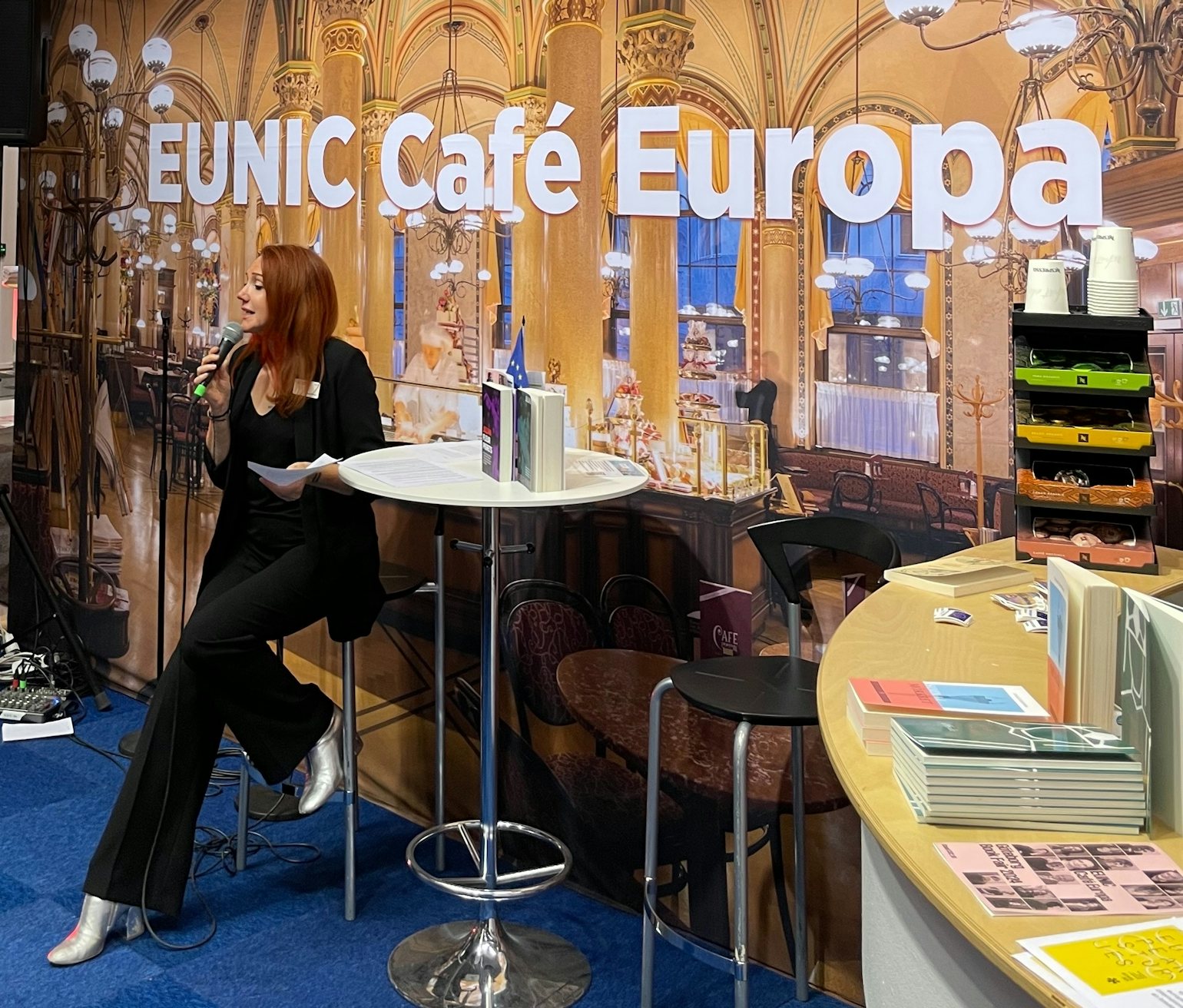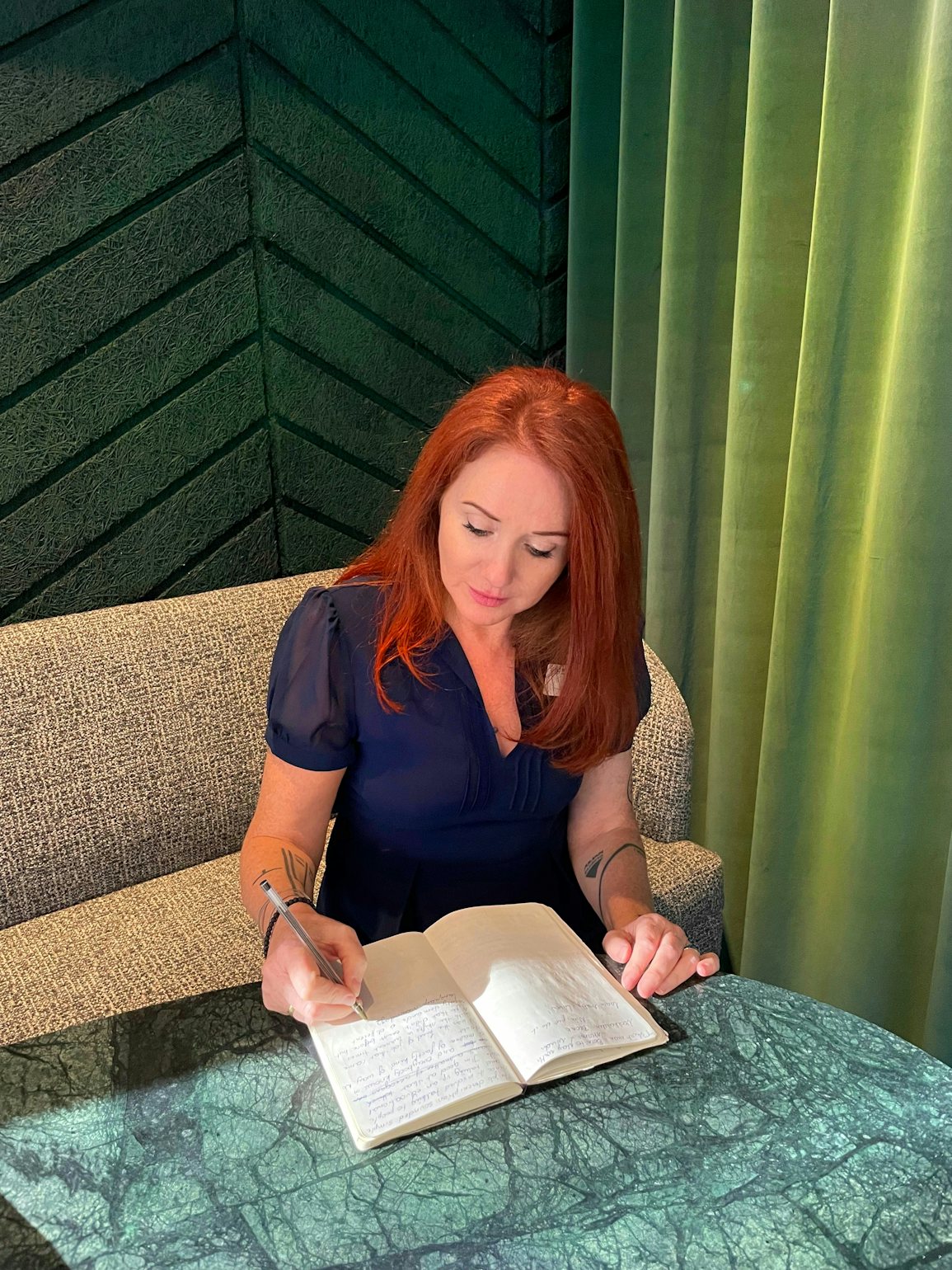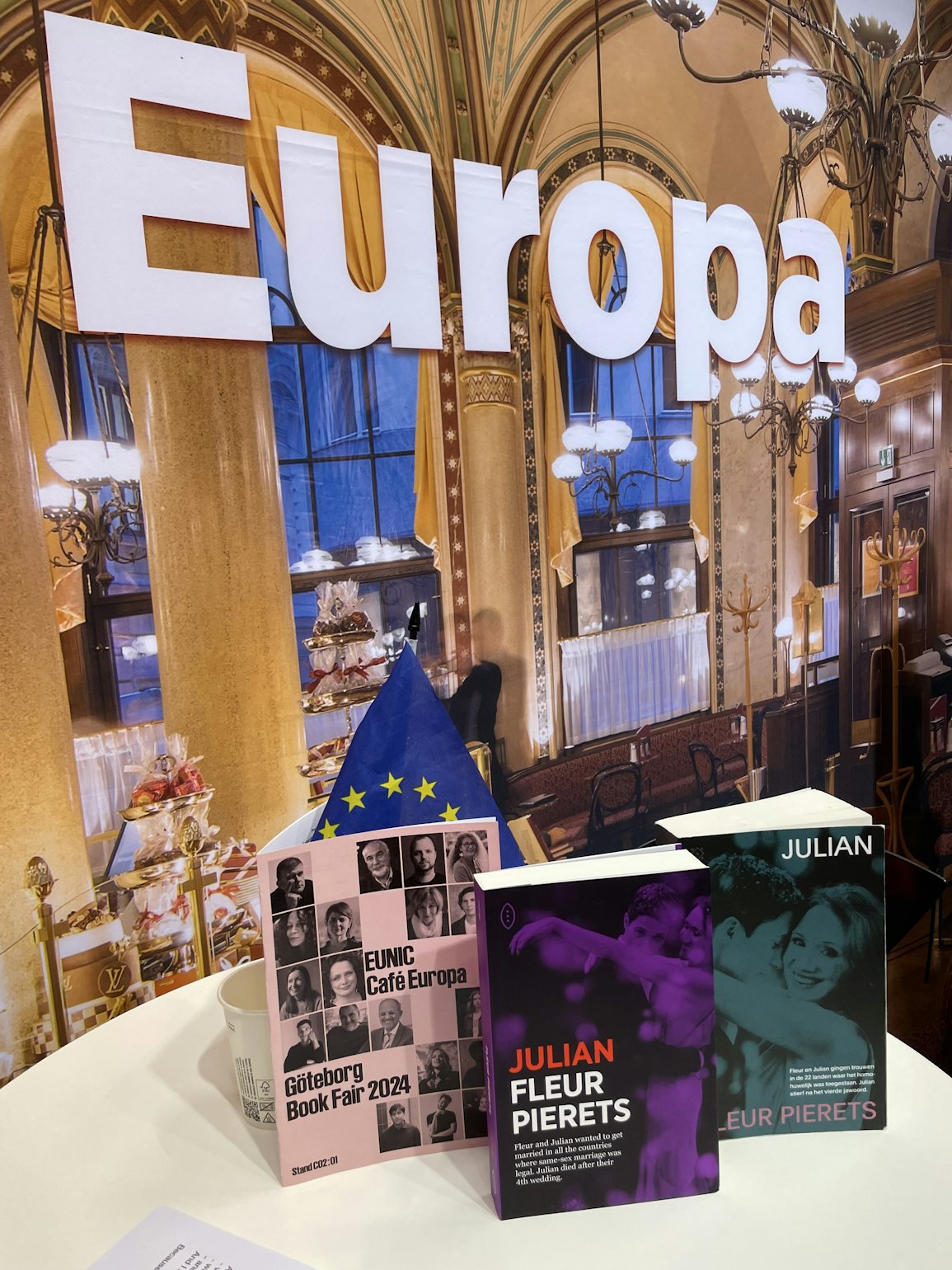Fleur Pierets: “Flanders is full of storytellers”
In 2027 Flanders and the Netherlands will be Guest of Honour at the Gothenburg Book Fair, and preparations have already begun. As well as several of the staff of Flanders Literature, author Fleur Pierets travelled to Göteborg in Sweden in late September to take part in a number of author programmes. Here is her report.

The Sámi are the Indigenous peoples of the Sápmi region, formerly known as Lapland, which encompasses large parts of northern Sweden, Finland, Norway and the Kola peninsula in Russia. At the opening of the book fair in Göteborg and from the 23rd floor of the Gothia Towers, looking out on the lights of the big wheel below, the Sámi treat us to a joik, one of the oldest musical forms in Europe.
Later, one of the singers compares the joik to the whirling of the northern lights, and according to oral tradition the Sámi were given their joik by fairies and elves from the Arctic. It was an important means of passing on knowledge and stories, but in the early 17th century and with the arrival of the missionaries, this singing tradition was branded sinful. For a long time the Sámi were forbidden to speak their own language.
Today they are Guest of Honour at the Gothenburg Book Fair, and so the tone has been set for this 40th edition:
Everyone united in their purpose, that of writers, of readers and the overarching space given to new voices. Voices that have always been here but are now actively being invited to occupy a stage.
The seismographs of time
In my first appearance, at the EUNIC stand (European Union National Institutes for Culture) and at the invitation of the Delegation of Flanders in the Nordic Countries, I talk about the power of stories. I’m convinced that if you want to understand history and society, you need to look at what storytellers, artists and writers have done. They are the dreamers, the visionaries, the seismographs of time. They don’t necessarily give the right answers, but they do pose the right questions. And I believe that’s the approach we need if we’re to get closer to an inclusive world.
What if instead of letting problems predominate, we fantasize about a new reality? What if we do things differently? What if?

Telling stories to bring about change, to get as many people around the table as possible. That’s my mission, at any rate. Because once we’ve all read and listened to each other’s stories, we can see the lie of the land. Then we can understand each other and together ensure that no rights are denied to ‘the other’. That we are more inclusive and that women, people of colour and queer people are part of the conversation too.
After my speech, I talk to people from Israel who, with the slogan ‘not in my name’, are making a statement against genocide, and with a woman who thanks me because she didn’t know that homosexuality is still illegal in seventy countries. She expresses her horror that in eleven of those seventy countries it still carries the death penalty. She can’t understand it, that sort of discrimination. She tells me that the word Sámi is derived from the Proto-Baltic word žēmē, meaning ‘land’. In modern Swedish and Norwegian, Sápmi is known as Sameland, a name that emphasizes togetherness.
An accumulation of dreams, sorrows and desires
It’s a theme that also pervades the seminar ‘Transcending Heteronormativity Through Literature’. The room is full and I share the stage with the wonderful writers Tomasz Jedrowski (‘Swimming in the Dark’), Robin Corminboef (‘A Summer in M.’) and Melania G. Mazzucco (‘Vita’). Lou Mattei, founder of PAGE 28, the only LGBTQ+ bookshop in Sweden, is in charge of the conversation and he wants to talk about the power of language and writing to liberate the body and soul. The subject appeals to me because that’s how it sometimes feels to live as a queer person: an accumulation of dreams, sorrows and desires that don’t necessarily fit the norm but are all that’s available to us. Writing helps. It’s a way to understand the world, a kind of operating manual, because there’s a lot of strength in vulnerability.
The audience nods unanimously when Tomasz talks about a queer family. About our capacity for understanding each other’s stories at a glance, even if we’ve never met. Recognition. Sameland.
LoveLetter to Alfhild Theresia Agrell

Later in the day, and after the legendary Joyce Carol Oates has been presented with the Gothenburg Book Fair’s new achievement award – a statuette of a mermaid – and has turned out ‘in the flesh’ to be the generous person her books lead you to expect, I go to write in the bar of the hotel. I’ve got a project called LoveLetters in which I write a letter from every city where I’m giving a talk to a forgotten woman of that city. To the women writers, the painters, the activists, the bohemians, the pioneers. To make history more truthful by bringing underrepresented voices into the limelight. To make the past, present and future more inclusive by means of stories.
Sitting at the bar, I write to Alfhild Theresia Agrell. In 1880 she was one of Sweden’s most famous playwrights and she mainly wrote about ‘double standards’. About gender inequality. I think of Melania G. Mazzucco, who spoke in our debate earlier, and of her most recent book ‘L’archittetrice’. It’s about the life of Plautilla Bricci, the first female architect in Western history, in seventeenth-century Rome. Melania’s version of my LoveLetter. I hope it becomes a trend.
The death spasm of an old world

In the debate I had the honour of being allowed the final word, and I said that we are living in a confusing time. In a time of transition. But that the society I’m fighting for is already here. It may not have become established yet, and it may still face a lot of resistance, but it’s undeniably here. I hope that one day, this time will be looked back on as a death spasm of the old world and the start of the new. A world for everybody, not just for a few.
I also hope to come back soon, because my first book ‘Julian’ is being translated into Swedish. Some of the people in the room are welcoming me already.
In 2027 Flanders and the Netherlands will be guest of honour at the Gothenburg Book Fair. In the exhibition halls I run into Paul Hermans and it occurs to me that the director of Flanders Literature has big shoes to fill after the Sámi. He nods in agreement and says it will be about more than just French fries and beer. I believe him. Because Flanders is full of storytellers. It’s up to us, together, to give shape to it all.
With thanks to:
Lotte & Geraldine of the Delegation of Flanders in the Nordic Countries.
Flanders Literature.